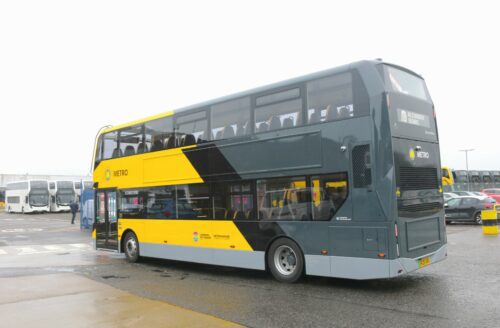
In a letter to Convener of the Economy and Fair Work Committee Colin Smyth, Scottish Cabinet Secretary for Finance and Local Government Shona Robison says she recognises the seriousness of the situation following the announcement by Alexander Dennis of plans to close its Scottish manufacturing sites and understands the need to work at pace to ensure that the company can find a way to retain its manufacturing base and workforce in Scotland.
The Cabinet Secretary said that in her latest discussions with the trade unions Unite and GMB as well as Alexander Dennis, she had taken the opportunity to restate a call for all parties to work together and had pressed ADL to consider chassis manufacturing as well as the possibility of single-deck bus construction in Scotland, which the manufacturer promised to do. Efforts are also being made to work to quantify future demand, she said, with work being carried out to analyse the UK-wide market, alongside which Transport Scotland is looking at the longer-term decarbonisation plans of Scottish bus operators, local authorities and Regional Transport Partnerships as well as considering EV charging infrastructure requirements.
Alexander Dennis has highlighted the need for a significant number of additional orders for the remainder of 2025 and into 2026 to enable it to secure the future of the site. The Cabinet Secretary said that the Scottish Government is liaising with commercial bus operators and local transport authorities to establish the current demand for double deck buses, which are currently produced at Falkirk, in Scotland and are working alongside UK Government to identify demand in other parts of the UK.
Legal framework
She added that the Government is also looking at what is possible within existing procurement legislation, within which there are provisions for a public body to consider how it can improve the economic, social and environmental well-being of its area and to act with a view to securing such improvements, as well as considering how it can facilitate the involvement of small and medium enterprises, third sector bodies and supported businesses, whilst not overriding the requirement to treat bidders equally and without discrimination. She also noted that although the Subsidy Control Act allows for social value to be considered in the awarding of subsidies it also prohibits subsidies that are contingent on the use of domestically produced goods or services to avoid a risk of distorting competition or investment in the UK.
“The Scottish Government has been working with the UK Government Department for Business and Trade (DBT) around the subsidy control elements of the proposed scheme which is intended to bridge any lead times following the end of the consultation period and work on any new orders being undertaken,” she said. “While the Subsidy Control Act is designed to be flexible, officials have emphasised the principles assessment will need to be well-evidenced and the Scottish Government will need to ensure a clear objective and timeframe for this assistance, in order to comply with the subsidy control principles. We are working closely with ADL on the parameters of such a scheme so that all options are considered during the consultation period.”
Concluding, the Cabinet Secretary said that she is aware of the importance of Alexander Dennis to Scotland and of retaining the jobs of skilled workers, and is continuing to work at pace with Scottish Enterprise and the UK Government as well as the company and trade unions to explore all viable options to support Alexander Dennis to retain bus manufacturing in Scotland.

